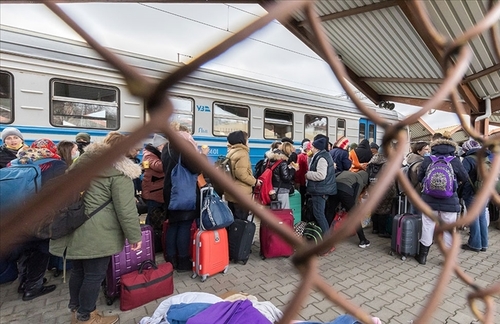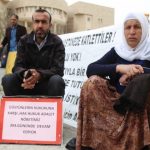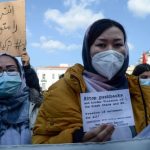The crisis in Ukraine is a wake-up call for Europe. There are already parallels being drawn between Vladimir Putin’s role in helping destroy Syria to protect the Assad regime, dispersing millions of Syrians in the process, and his role in destroying Ukraine and driving millions more people out of their homes.
A European policy of protecting itself by keeping some refugees out and selectively allowing others in is both shortsighted and unsustainable. It also goes against the values that constitute the keystone of the EU — and tampering with them threatens the whole edifice.
Since the fall of the Berlin Wall, the European bloc has had grand visions of spreading its values eastward toward the former Warsaw Pact states and southward in the Mediterranean. The idea was that good governance would lead to peace and prosperity, which would ensure security and curb the flow of migrants and refugees.
In the early 2000s, a terrorist threat was added to the mix and ambitions of fixing the neighborhood emerged in parallel with the Afghanistan and Iraq invasions and the accompanying American democratization agenda.
The strategy was that refugee flow into Europe should be controlled at source, by helping countries reform so that their populations would want to stay at home. These ambitions have mostly been abandoned and the policy now seems to have been reduced to a crude and unsustainable attempt to keep refugees out or welcome some of them based on criteria of race and religion.
While walls were being torn down and borderless travel was the dream of the early 1990s, barriers are now coming up again, with more than 1,000 km of barbed wire fence built along the EU’s border from Latvia to Greece via Lithuania, Poland, Hungary and Bulgaria, most of it since 2015 in an attempt to stop the inflow of refugees from the Middle East via Turkey.
The image is that of a “Fortress Europe” being assaulted by land, air and sea, with an invasion of refugees upsetting the continent’s internal stability. Every failed state translates into more people seeking refuge in Europe’s “paradise,” threatening its unity and declared values. The impact has shaken the EU at its foundations and includes the UK’s Brexit and the rise of the far right and populist leaders in several states, along with the risk of further disintegration.
Javier Solana’s 2004 dictum, delivered at the launch of the European Neighborhood Policy, was a vision of security delivered by a Europe “surrounded by a ring of well-governed states.” In Paris four years later, Solana was with Nicolas Sarkozy and other European leaders posing for a group photo surrounded by a ring of rulers of the worst-governed states: Bashar Assad of Syria, Hosni Mubarak of Egypt, Abdelaziz Bouteflika of Algeria, and Zine El-Abidine Ben Ali of Tunisia. That picture encapsulates the failure of a European policy that aimed to prevent what we now see as the worst refugee crisis since the Second World War.
In 1995, as Spain’s minister of foreign affairs, Solana had launched the Barcelona Process, a Euro-Mediterranean Partnership that hoped to ensure a common area for peace and prosperity.
One way of understanding the intricacy of these policies is simply through internal EU rivalries and the complex transatlantic relations.
A huge enterprise was undertaken in Europe after the fall of the Berlin Wall. Under the heading of EU enlargement, a massive bureaucracy was created, at great expense, to transform the countries of the east into states with European values that were suitable to enter the union. This consisted of about 30 chapters, each containing dozens of bullet points, amounting to more than 80,000 pages of rules and regulations that had to be applied to any country that wanted to join the bloc.
The process of EU enlargement, which was mainly led by Germany, diverted much of its funding to areas where Berlin had historic interests and relations. This raised concerns in states like France, Italy, Spain and Portugal, which wanted to divert some of the EU’s budget to their own areas of historic relations on the southern shores of the Mediterranean. Thus, the Barcelona Process was born.
In 2004, after most countries in Eastern Europe had gained accession to the EU, the northern countries, again led by Germany, wanted to use the skills they had acquired through this enlargement to improve the countries even further to the east, like Ukraine, Georgia, Moldova and Belarus. Again, the southern states wanted to include the Mediterranean states: Why not apply these tools to improve all the EU’s neighbors? This led to the creation of the European Neighborhood Policy, which was in tune with America’s democratization agenda, while the underlying European agenda was to curb the inflow of refugees and migrants.
Enter Sarkozy in 2008 and his Union for the Mediterranean, which was born in an atmosphere of decreasing enthusiasm for democratization and regime change following what was seen as a disastrous experience in Iraq. This was going to be a union for cooperation between the northern and southern states of the Mediterranean, which would continue with “renewed dynamism the quest for peace and cooperation, to explore their joint problems and transform these good intentions into actions in a renewed partnership for progress.” In other words, this translates into “let’s do business and forget about all these grand ideas of democratization and reform.” But German Chancellor Angela Merkel intervened again and the policy was expanded to include all 27 EU countries and all 15 southern Mediterranean neighbors.
When the real transformations came, with the emergence of the Arab Spring and the colored revolutions, the Europeans were not ready for them. They had settled into a narrative that made their policy sound coherent, with a seamless continuity between the Euro-Mediterranean Partnership, the European Neighborhood Policy and the Union for the Mediterranean.
They were happy dealing with the regimes and thought that, if they could de-Stalinize Nicolae Ceausescu’s Romania, then they were in familiar territory in Assad’s Syria. They were going to do it the European way and transform the regimes, rather than the American way, which overthrows them and creates a chaos of forces that they were not familiar with and had no tools for.
The EU was founded on a common set of values, tampering with them shakes the whole edifice.
Nadim Shehadi
Instead of policies to help reform and keep the refugees at home, agreements are now being made between the EU as a bloc and countries like Turkey, Libya and Morocco, in which the partner states help curb the immigration flow to Europe in exchange for financial aid. Such deals have been heavily criticized by human rights groups as a way to circumvent international humanitarian obligations, especially when there was flagrant discrimination based on race and religion.
The scene is becoming familiar. We now have refugees from Ukraine flooding into the EU, but before that we had Afghans, Syrians, Iraqis and people from North Africa and Sub-Saharan Africa. Navies try to prevent refugee-laden boats from landing on European soil. Fences and border guards try to stop them crossing overland. Refugees die traversing dangerous paths or drown in the Mediterranean. None of this is sustainable.
Refugees are not the problem and deals with despotic regimes are not the solution — it is exactly the other way round.
By. Nadim Shehadi – a Lebanese economist. Twitter: @Confusezeus
Source: Arab News
***Show us some LOVE by sharing it!***



